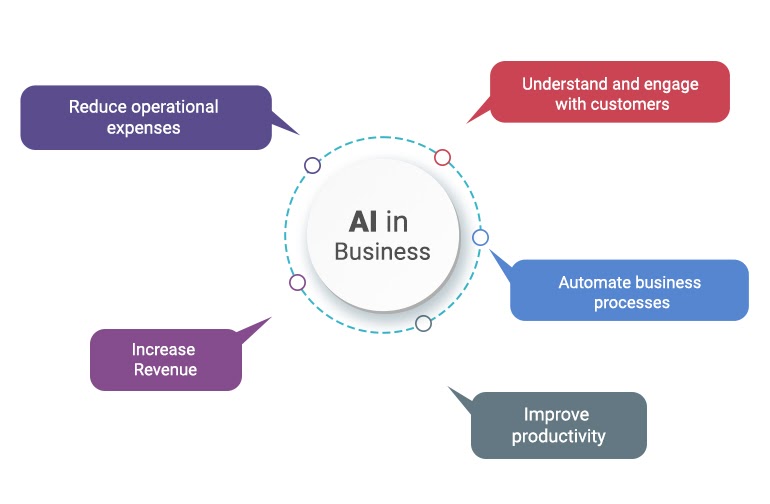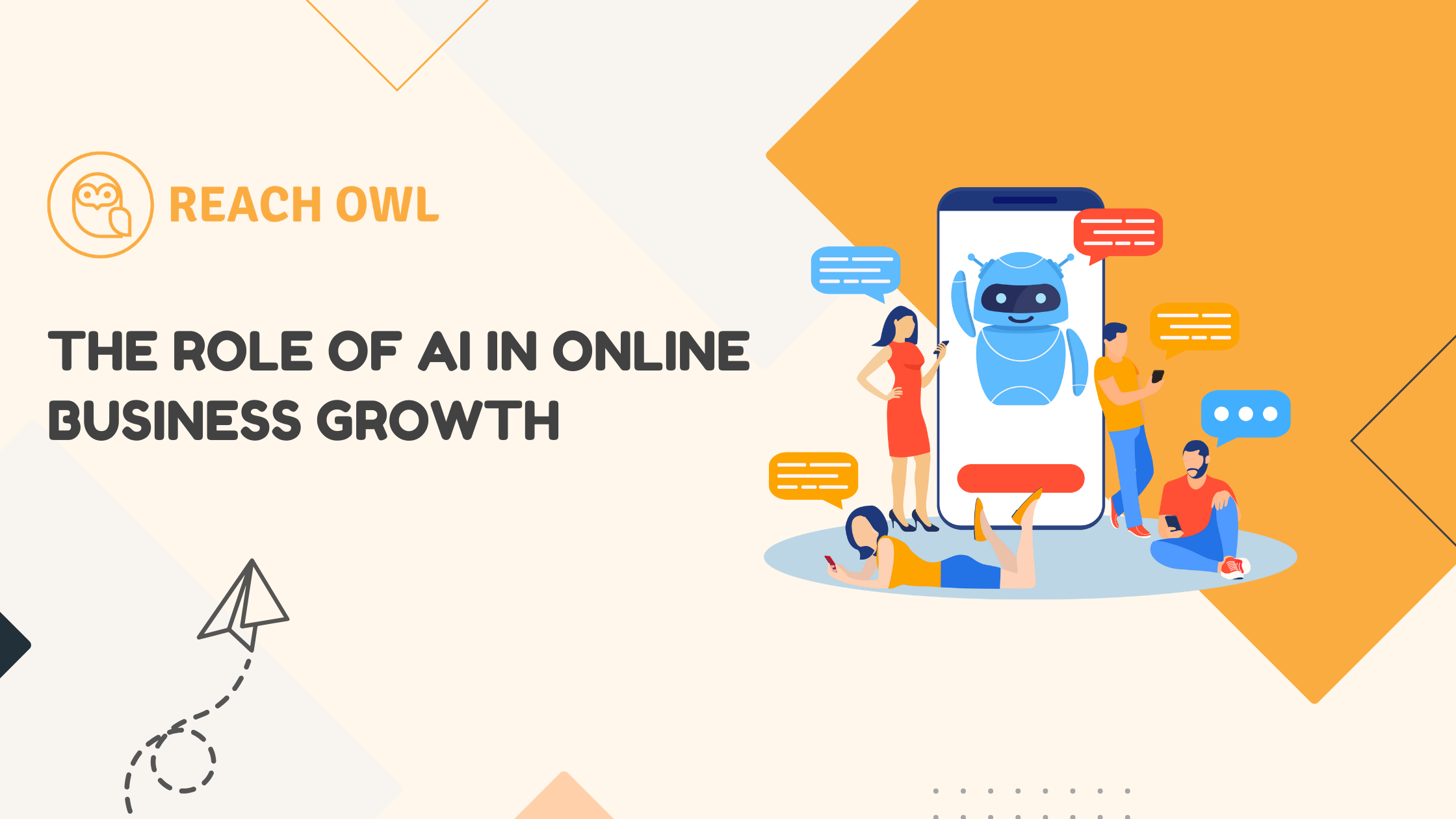Artificial intelligence (AI) is changing the business world, especially in e-commerce. It’s used for personalized marketing, better customer service, and data-driven decisions, all of which help online businesses grow.
This blog will explain how AI is making a big difference in online business success.

1. Personalization and Customer Experience
-
Personalized Product Recommendations:
AI helps online businesses by giving personalized product recommendations. It looks at what you’ve looked at and bought before, and then suggests things you might like. This makes shopping better for you and helps businesses sell more.
-
Chatbots for Customer Service:
AI chatbots are changing how customer service works for online businesses. They can answer common questions, help you buy things, and are available all the time. This makes customers happy and saves businesses money because they need fewer human customer service agents.
-
Enhanced User Experience:
AI can analyze and interpret user behavior to improve the overall user experience. It can identify pain points, offer real-time solutions, and even adapt website layouts to provide a smoother, more personalized journey for each visitor.
2. Marketing and Advertising
-
Targeted Advertising:
AI helps businesses show their ads to the right people. It looks at user data and figures out who should see the ads. This means more people buy things from the ads, and the business makes more money for what they spent on advertising.
-
Content Personalization:
AI can analyze user preferences to personalize website content. This can include customizing the homepage, product descriptions, and blog recommendations, making the site more engaging and likely to convert visitors into customers.
-
A/B Testing and Optimization:
AI can perform rapid A/B testing to determine the most effective website design, ad copy, or marketing strategies. This iterative approach ensures that businesses are continually improving their online presence.
3. Inventory Management and Supply Chain
-
Demand Forecasting:
AI can analyze historical data and what’s happening in the market to guess how many products people will demand in the future. This helps businesses have just enough products in stock without having too many. It saves them money and keeps customers happy.
-
Supply Chain Efficiency:
AI can be used to optimize the supply chain, reducing delays and costs. It can predict when equipment will fail, optimize routes for shipping, and improve overall supply chain efficiency.
-
Quality Control:
AI can inspect products for defects and ensure quality control in manufacturing. This reduces the number of faulty products reaching customers and improves the brand’s reputation.
4. Data Analysis and Decision-Making
-
Data Processing:
Online businesses create lots of data every day. AI can quickly look at all this data and find out how customers act, what sells the most, and what’s happening in the market.
-
Business Intelligence:
AI can generate leads actionable insights from data, helping businesses make informed decisions. For example, it can recommend which products to promote, which markets to target, and which marketing channels to invest in.
-
Predictive Analytics:
By analyzing historical data and current trends and what’s happening now to guess what might happen in the future. This is really helpful for knowing what customers will want, how much stuff you’ll need, and what’s going to change in the market.
5. Fraud Detection and Security
-
Payment Fraud Detection:
AI is great at finding patterns and things that look weird. In online businesses, this is particularly useful for identifying and preventing payment fraud, so it keeps the business and its customers safe.
-
Cybersecurity:
AI is really good at keeping things safe online. It can find weak points, watch for strange activity on the internet, and stop problems as they happen. This is important for online businesses that deal with private customer information.
-
Authentication:
AI can enhance user authentication processes. Biometric authentication, voice recognition, and behavioral biometrics are all examples of AI-driven authentication methods.
6. Email marketing
Email marketing is one of the methods to increase website traffic without SEO.
-
Segmentation and Personalization:
AI can segment email lists based on various criteria and personalize email content accordingly. This ensures that recipients receive emails relevant to their interests and needs.
-
Automated Email Campaigns:
Online businesses can set up automated email campaigns triggered by user actions. For example, when a customer abandons their cart, AI can automatically send a reminder email, increasing the chances of conversion.
-
Subject Line Optimization:
AI can analyze subject lines to determine which are most likely to result in email opens and click-throughs. This optimization can significantly improve the performance of email marketing campaigns.
7. E-commerce chatbots
-
Customer Support:
Chatbots provide instant customer support, answer frequently asked questions, and guide customers through the buying process. They can handle multiple inquiries simultaneously, ensuring customers receive quick responses.
-
Cart Abandonment Recovery:
When a customer abandons their shopping cart, AI-powered chatbots can send reminders and even offer incentives to complete the purchase, reducing cart abandonment rates.
-
Product Recommendations:
Chatbots can suggest products based on a user’s preferences and previous interactions with the website, effectively acting as personal shopping assistants.
8. SEO and Content Creation

-
Content Optimization:
AI tools can analyze content for Search Engine Optimization (SEO) by identifying relevant keywords, improving readability, and ensuring that content is more likely to rank well in search engine results.
-
Content Generation:
AI can also generate content, such as product descriptions, news articles, and even reports. This can save time and resources while maintaining quality.
-
Voice Search Optimization:
With the rise of voice-activated devices, AI helps businesses optimize their content for voice search, increasing their visibility in this growing market.
-
Challenges and Ethical Considerations:
While AI brings incredible benefits to online businesses, there are also challenges and ethical considerations to navigate.
-
Data Privacy:
Collecting and using customer data raises concerns about privacy. Businesses must ensure they handle data ethically and securely.
-
Bias in AI:
Generative AI program can sometimes continue unfair patterns in decision-making. Businesses need to be aware of this and take steps to make sure AI is fair in how it works.
-
Cybersecurity Threats:
As AI technology becomes more advanced, the risks associated with cyber threats also increase. Therefore, businesses need to invest in strong cybersecurity measures to protect their systems and data.
-
Lack of Human Touch:
Relying too much on AI for customer interactions can reduce the personal, human touch, which may affect customer satisfaction.
Conclusion
Generative AI is a powerful tool for online businesses, driving growth through personalization, improved marketing, efficient operations, and data analysis. However, businesses must use AI ethically, considering privacy and avoiding biases.
Balancing automation tool with a human touch is important. When used effectively and responsibly, AI helps online businesses succeed in a competitive digital world. It’s not just a tool; it’s essential for business growth.

